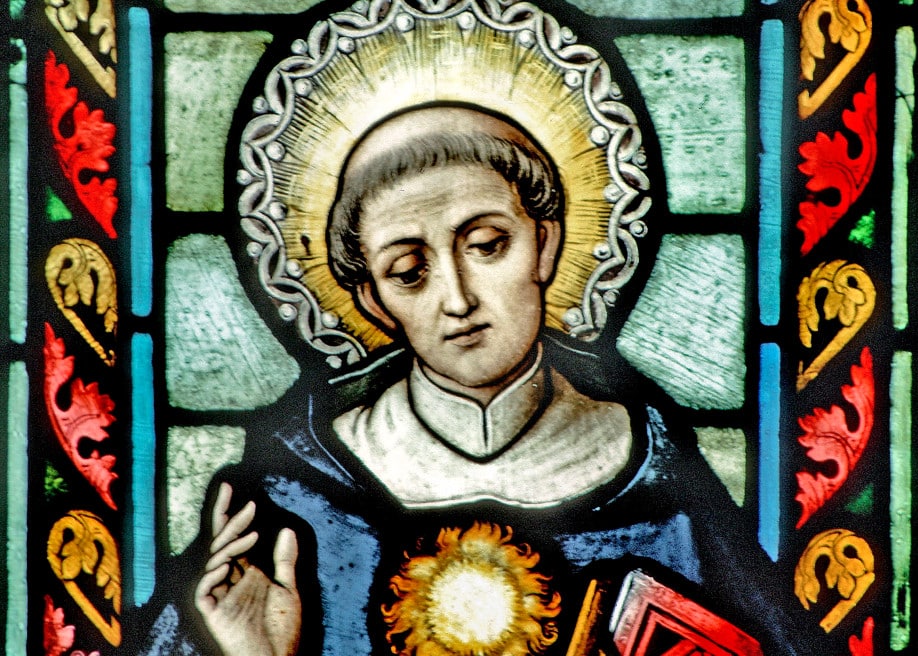If you want your spiritual life to go well, it’s best to make clear commitments to concrete practices. The basic idea is that structure makes sense of your life; in fact, it makes you free. There are so many different things you can do with your day that it can be overwhelming and even paralyzing at times. If you walk into a gym with no plan, you might just wander around, self-consciously pick up a dumbbell or two, work the elliptical for 10 minutes, and then leave, confused and embarrassed. A plan calms you down and focuses your efforts.
With that said though, making a plan of life is not as easy as following every pious recommendation or imitating every saint. The concrete practices will vary depending on your circumstances. Most plans of life will involve some arrangement of prayer, Mass, confession, community/friendships, study (especially of Sacred Scripture), penitential practices and your work/apostolate/ministry. But, these elements need to be arranged as part of your personal plan. What follows is some of my own experience with making a plan of life and some helpful tips for making your own.
My plan of life
Personally, I don’t know that I had anything resembling a plan of life before college. In high school, I needed to plan a bit, but most of my life was scripted for me by my family. The family prayed a Rosary together every night. The family went to confession about once a month. The family went together to Sunday Mass. Sometimes (i.e., when bribed with going out to breakfast afterward) I would join my mom for Mass on a weekday. Thus, my plan was more gravitational than motivational, if you will.
When I went to college, I had to step it up. Truth be told, Franciscan University was like The Pine Family 2.0 in terms of positive peer pressure, but I soon discovered that much more was left up to my own decisions. I chose when I woke up, when I prayed, when I went to Mass and so on. With this newfound freedom came the need for a bit more discipline, and it was at this time that I was first counseled to make a plan of life.
In one particular class, I read a book called “The Intellectual Life” by A. G. Sertillanges (recommended), a French Dominican priest of the last century (he died in 1948). The book is written for young believers trying to plan their lives around the pursuit of sacred truth. In the book, the author describes a disciplined approach to study (and life more broadly). In the early chapters, he encourages his reader, and in the later chapters he recommends practical methods for shaping one’s day. I was very moved by the book, and I gave some of his proposals a try, albeit within bounds. Effectively, I scheduled my life from Monday to Friday during business hours. Otherwise, I remained relatively unstructured. After all, there was lots of hiking, paddling and river-jumping to get to.

Receiving a plan of life
Little did I know, but Father Sertillanges’s vision would take hold of my life in just a few short years, for though he titled his book “The Intellectual Life,” it may just as well have be named “The Dominican Life.” Upon graduating, I entered the Dominican Order and set out to live “the intellectual life” in a new register. In the novitiate (the first year) and the studium (the next five years), my sketchy plan of freshman year underwent a couple of changes.
First, the plan was no longer a 9-to-5-on-workdays sort of thing. It shaped the whole of my week. One of the friars would often comment, “There’s no vacation from your vocation,” and that was the truth. Limiting my plan to working hours wouldn’t cut it, and I began to process all of my efforts in terms of their place in the plan. On the one hand, it was a joy to try to live so coherently. On the other hand, it was just a little painstaking.
Second, the plan became more intense. I felt the drive for spiritual perfection more acutely. Not a stray word permitted. Not a remiss act tolerated. During my nightly examination of conscience, I would review the day’s events with a new scrutiny, judging them against the ideal. Again, on the one hand, it was energizing to live so deliberately. But, on the other hand, I felt the weight of my unwillingness.
At some level, all of us experience something of this comprehensive zeal. We want to live wholly for the Lord in an intentional way. With this desire, though, comes a subtle temptation: We begin to act as if everything were up to us, as if the plan were simply ours.
The reality is that the plan is first his, and we can only live our lives for his glory and our salvation because he empowers us to do so. Even our desire to plan is itself God’s gift. Within the grand scheme of things, we simply aren’t competent to call all the shots, for it is God who gives us breath, who gives us choice, and who gives us grace to live for him.
This fact was impressed upon me in religious life in a particular way because the plan was given to us. Whereas in college my approach to a plan of life seemed to come from within, my Dominican plan more clearly came from without. It was given to me by Christ who called me, by St. Augustine wrote the Rule, by St. Dominic who received the grace, by my forebears who crafted our legislation, and by my superiors who oversaw my formation. My responsibility wasn’t to make it up. It was to receive it and to live it. “Show me a man who follows the rule perfectly,” we were told, “and I’ll show you a saint.” My Dominican plan of life was a gift, and I could receive that gift by remaining faithful.
Within the grand scheme of things, we simply aren’t competent to call all the shots, for it is God who gives us breath, who gives us choice, and who gives us grace to live for him.
Making a plan of life
Fine, but what about the lay person who isn’t given a preestablished plan of life? Is he doomed to make it up as he goes along? Or to act as if the plan were his? Where can he look for a good plan of life that’ll bind him with clear commitments to concrete practices? Thanks be to God, we all have the opportunity to receive a plan of life and live it within the Church’s tradition.

When making a plan of life, we can start with the precepts of the Church. We can draw further inspiration from those acts for which she grants plenary indulgences. Then, we can look to the teaching and example of her doctors, saints and mystics. (St. Francis de Sales’s “Introduction to the Devout Life” is a classic. Indeed, one of the Catholic classics.) We can also discern the matter with a confessor, spiritual director, spouse or close friend in light of our particular circumstances (and state of life). Father Roger Landry’s recent “Plan of Life” is a great resource for doing just that.
For the sake of giving an example, you might commit to 20 minutes of prayer each morning, one Mass a week in addition to your Sunday obligation, monthly confession, regular participation in a parish faith-formation group, subscription to a good Catholic podcast, a conscious effort not to snack between meals, and service every other week with the Missionaries of Charity. Perhaps you take one afternoon each month for some quiet recollection, and perhaps once a year you go on a retreat or make a pilgrimage for a few days.
As you have probably already discovered, these spiritual commitments necessitate further human commitments. For instance, if you want to be attentive at prayer in the morning, you might have to get more sleep. To do that, you’ll probably need to use your cell phone less at the end of the evening. So, you set a limit to your usage: No cell phone after 10:30 p.m. Similar judgments will have to be made throughout your life. If you intend to hold firm to your resolutions, you have to take practical steps to bring order to the whole of your life. A plan of life will dictate the terms of your diet, your sleep, your connectivity, your work and your relationships. And with this human and spiritual discipline comes the promised freedom, freedom to choose what you genuinely love and what you aspire to love better. If that seems a daunting task, fear not. Here, by way of conclusion, are a few tips for making your plan of life that can help you along.
With this human and spiritual discipline comes the promised freedom, freedom to choose what you genuinely love and what you aspire to love better.
10 tips for your plan of life
1. Breathe. Remember, it’s his plan before it’s ever yours. The Lord Jesus Christ is the sole mediator of salvation. He has no strict need for our assistance. If he chooses to employ our efforts and our plans, it’s because he is good; it’s because he wants to give us the opportunity to share in his divine life even more. His sovereignty and his providence have to remain always in focus. A plan of life is first a work of the Lord Jesus who seeks to save us from mediocrity.

2. Don’t take yourself too seriously. The general tendency in life is to take things more and more seriously. And yet, the weight of the world can’t be allowed to crush your childlike spirit. As G.K. Chesterton writes of the angels, “[They] can fly because they can take themselves lightly.” We should strive for a similar levity. As St. John XXIII said to the Lord each night before putting his head on the pillow, “It’s your Church, Lord. You save it.” So too we can say, “It’s your plan, Lord. You manage it.”
3. Be prepared for interruptions. Whether it’s a traffic jam or an urgent request from a friend, things are going to happen that you didn’t foresee. You might be tempted to see these moments as a waste. Don’t fret. What matters is that you seek the Lord. So if you’re on your way to the chapel and a homeless man asks you for money, it’s good to stop, offer something to eat, and have a quick exchange, even if it may cut into your prayer time. As St. Vincent de Paul preached, “Do not become upset or feel guilty because you interrupted your prayer to serve the poor. God is not neglected if you leave him for such service. One of God’s works is merely interrupted so that another can be carried out.” You are made for more than efficiency. You are made for love.
Whether it’s a traffic jam or an urgent request from a friend, things are going to happen that you didn’t foresee. You might be tempted to see these moments as a waste. Don’t fret. What matters is that you seek the Lord.

4. Don’t overplan. Be modest in your expectations. There’s not much sense in being overly ambitious at the beginning only to be terribly frustrated at the end. I used to bring a stack of books with me whenever I traveled, perhaps for fear that I’d read them all and then not have anything to do. I never did, not even close. Now, I bring two or three. If I finish them, I can think about Jesus or call a friend.
5. Be open to adjusting the plan. A plan of life is also something that you want to revisit in prayer and in conversation. Revise at times in the presence of the Blessed Sacrament, or vet it with a close friend or regular confessor. For the most part, a plan of life is a fixed thing, but certain seasons of life will require you to adjust. The plan is meant to orient your journey toward its destination. Along the way, there are bound to be twists and turns. Take them in stride.
6. Leave room for spontaneity. As we say, when we think of our time as if it were wholly ours, we can become strangely obsessive and possessive. Remember that you are the steward of your time, not its master. Who knows what awaits you in the hours ahead? That’s part of the excitement. So, permit some space for the spontaneous. Certainly, as you get older, you’ll get set in your ways, but the need for the spontaneous abides. You should have time to say “Yes!” to a random invitation.
7. Leave room for rest. St. John the Evangelist taught that the bow can’t stay strung all the time. If it does, it loses its zing. We all need leisure, some kind of contemplative repose. You should have time to think. So too, you should have time to do nothing. The Lord doesn’t ask you to optimize your output or to sacrifice your humanity on the altar of an empty inbox. So, if you have a snow day, take the snow day. Cancellations don’t need to be turned immediately into more work. Also, sleep. It’s often the difference between enjoying life and not. (By the way, it’s good to enjoy life.) Mothers, when the kids are napping, you don’t have to fold laundry. You can nap with them. You’ll never catch up, and that’s fine. You have all of eternity for getting caught up.

8. Leave room for the other. Don’t schedule others out of your life. Sure, others are bound to place demands and throw a wrench in all your plans, but they are the greatest richness imaginable. Human life isn’t about maximizing pleasure and minimizing pain. It’s about finding those with whom you want to share your love, and then sharing it. I once walked the Camino with the intention of keeping up with my work along the way. It was a disaster. Several days in, I decided to shift gears and chat with the people I met. It was a revelation. I’m happy to call a few of them friends.
9. Don’t compare. Or, if you do compare, make healthy comparisons. Your plan of life is a personal response to God’s call. There are certain objectively good things that you should take into consideration, but you still have to appropriate those goods as your own. You are called to live this life, with these people, in this time and this place. Your plan of life isn’t intended for an ideally holy existence. It’s intended for your holy existence. We are all seeking to follow the Lord Jesus. Different Christians propose different ways of doing so. A plan of life should represent your way of following Jesus adapted to your life in the here and now.
10. Don’t judge yourself too harshly. You cannot think of every poorly-used minute as if it were a failure or sin. Don’t hyper-moralize your spiritual task completion. You are not a robot. You are a child of God. Treat yourself with the mercy proper to a member of his household.
You cannot think of every poorly-used minute as if it were a failure or sin. Don’t hyper-moralize your spiritual task completion. You are not a robot. You are a child of God.
Ultimately, the Lord has placed your life in your hands. He calls you to himself, and he is excited to see how you will respond. A rule of life is meant to make our purpose clear so that we have an easier time pursuing it. Rather than having to think through my life every minute of every day, I can consult the plan that I’ve discerned and try to put it into practice.
All discipleship requires discipline. A plan of life provides just such a discipline that helps us, the students, to remain faithful in the school of the master. At root, the discipline of a plan of life is in service of freedom. “For freedom Christ set us free; so stand firm and do not submit again to the yoke of slavery” (Gal 5:1). So while a plan may feel, at times, like a kind of slavery, remember that it is a sweet slavery that begets a glorious freedom. “Take my yoke upon you and learn from me, for I am meek and humble of heart; and you will find rest for yourselves. For my yoke is easy, and my burden light” (Mt 11:29-30).
Father Gregory Pine, OP, is the author of “Prudence: Choose Confidently, Live Boldly” (OSV, $16.95).







